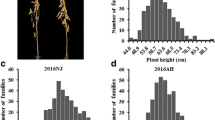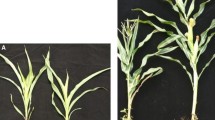Abstract
Plant height is one of the most important agronomic traits in soybean. The semi-dwarf soybean cultivars could improve lodging resistance and solar radiation use efficiency so as to increase soybean yield. However, the inheritance of semi-dwarf traits has not been intensively studied and few semi-dwarf genes have been isolated in soybean. In this study, we use specific-length amplified fragment sequencing (SLAF-seq) with bulked segregant analysis (BSA) to map the semi-dwarf gene in soybean. Plant height of 213 F2:3 families, derived from a cross between ‘Jimidou-1’ (semi-dwarf) and ‘Gongjiao9112’ (tall), was evaluated under field conditions. Genetic analysis indicated that the semi-dwarf trait was controlled by one single recessive gene. Associated with the semi-dwarf trait, SLAF-seq combined with BSA was used to develop polymorphic SLAF markers and identify a 1.04 Mb genomic region, which was designated as sdf-1. The sdf-1 locus was delimited to 80.72 kb region on chromosome 19 by KASP SNP markers developed from the SLAF markers and 6 K SNP chip. There were 14 putative genes in the associated region. From annotation information, three genes (Glyma.19g194800, Glyma.19g194500 and Glyma.19g195200) might be interesting candidate genes that are highly related to plant height growth or semi-dwarf trait. The successful identification and localization of sdf-1 could help reveal molecular mechanisms underlying soybean semi-dwarfism and to indirectly improve total yield.



Similar content being viewed by others
References
Abe A, Kosugi S, Yoshida K, Natsume S, Takagi H, Kanzaki H, Matsumura H, Yoshida K, Mitsuoka C, Tamiru M, Innan H, Cano L, Kamoun S, Terauchi R (2012) Genome sequencing reveals agronomically important loci in rice using MutMap. Nat Biotechnol 30:174–178. https://doi.org/10.1038/nbt.2095
Austin RS, Vidaurre D, Stamatiou G, Breit R, Provart NJ, Bonetta D, Zhang J, Fung P, Gong Y, Wang P, McCourt P, Guttman DS (2011) Next-generation mapping of Arabidopsis genes. Plant J 67:715–725. https://doi.org/10.1111/j.1365-313X.2011.04619.x
Bastien M, Sonah H, Belzile F (2014) Genome wide association mapping of Sclerotinia sclerotiorum resistance in soybean with a genotyping-by-sequencing approach. Plant Genome. https://doi.org/10.3835/plantgenome2013.10.0030
Boerma HR, Jones BG (1978) Inheritance of a second gene for brachytic stem in soybean. Crop Sci 18(4):559–560. https://doi.org/10.2135/cropsci1978.0011183X001800040008x
Byth DE, Weber CR (1969) Two mutant genes causing dwarfness in soybeans. J Hered 60(5):278–280. https://doi.org/10.1093/oxfordjournals.jhered.a107993
Chen W, Yao J, Chu L, Yuan Z, Li Y, Zhang Y (2015) Genetic mapping of the nulliplex-branch gene (gb_nb1) in cotton using next-generation sequencing. Theor Appl Genet 128(3):539–547. https://doi.org/10.1007/s00122-014-2452-2
Cheng W, Gao J, Feng X, Shao Q, Yang S, Feng X (2016) Characterization of dwarf mutants and molecular mapping of a dwarf locus in soybean. J Integr Agric 15(10):2228–2236. https://doi.org/10.1016/S2095-3119(15)61312-0
Cooper RL (1981) Development of short-statured soybean cultivars. Crop Sci 21(1):127–131. https://doi.org/10.2135/cropsci1981.0011183X002100010034x
Fehr WR (1972) Inheritance of a mutation for dwarfness in soybeans. Crop Sci 12(2):212–213. https://doi.org/10.2135/cropsci1972.0011183X001200020019x
Geng X, Jiang C, Yang J, Wang L, Wu X, Wei W (2016) Rapid identification of candidate genes for seed weight using the SLAF-Seq method in Brassica napus. PLoS ONE 11(1):e0147580. https://doi.org/10.1371/journal.pone.0147580
Han EH, Sung MK, Kim KR, Park JS, Nam JW, Chung JI (2011) Independent inheritance between df2 gene and ti gene in Soybean. Korean J Crop Sci 56(1):14–17. https://doi.org/10.7740/kjcs.2011.56.1.014
Han Y, Lv P, Hou S, Li S, Ji G, Ma X, Du R, Liu G (2015) Combining next generation sequencing with bulked segregant analysis to fine map a stem moisture locus in sorghum (Sorghum bicolor L. Moench). PLoS ONE 10(5):e0127065. https://doi.org/10.1371/journal.pone.0127065
Hedden P (2003) The genes of the Green Revolution. Trends Genet 19(1):5–9. https://doi.org/10.1016/S0168-9525(02)00009-4
Hill JT, Demarest BL, Bisgrove BW, Gorsi B, Su YC, Yost HJ (2013) MMAPPR: mutation mapping analysis pipeline for pooled RNA-seq. Genome Res 23(4):687–697. https://doi.org/10.1101/gr.146936.112
Hu M, Zhang H, Liu K, Cao J, Wang S, Jiang H, Wu Z, Lu J, Zhu X, Xia X, Sun G (2016) Cloning and characterization of TaTGW-7A gene associated with grain weight in wheat via SLAF-seq-BSA. Front Plant Sci 7:1902. https://doi.org/10.3389/fpls.2016.01902
Hwang WJ, Kim MY, Kang YJ, Shim S, Stacey MG, Stacey G, Lee SH (2015) Genome-wide analysis of mutations in a dwarf soybean mutant induced by fast neutron bombardment. Euphytica 203(2):399–408. https://doi.org/10.1007/s10681-014-1295-x
Jia Q, Tan C, Wang J, Zhang X, Zhu J, Luo H, Yang J, Westcott S, Broughton S, Moody D, Li C (2016) Marker development using SLAF-seq and whole-genome shotgun strategy to fine-map the semi-dwarf gene ari-e in barley. BMC Genomics 17:911. https://doi.org/10.1186/s12864-016-3247-4
Jiang B, Liu W, Xie D, Peng Q, He X, Lin Y, Liang Z (2015) High-density genetic map construction and gene mapping of pericarp color in wax gourd using specific-locus amplified fragment (SLAF) sequencing. BMC Genomics 16:1035. https://doi.org/10.1186/s12864-015-2220-y
Kang H, Weng Y, Yang Y, Zhang Z, Zhang S, Mao Z, Cheng G, Gu X, Huang S, Xie B (2011) Fine genetic mapping localizes cucumber scab resistance gene Ccu into an R gene cluster. Theor Appl Genet 122(4):795–803. https://doi.org/10.1007/s00122-010-1487-2
Kantarek Z, Masojć P, Bienias A, Milczarski P (2018) Identification of a novel, dominant dwarfing gene (Ddw4) and its effect on morphological traits of rye. PLoS ONE 13(6):e0199335. https://doi.org/10.1371/journal.pone.0199335
Lark KG, Chase K, Adler F, Mansur LM, Orf JH (1995) Interactions between quantitative trait loci in soybean in which trait variation at one locus is conditional upon a specific allele at another. PNAS USA 92(10):4656–4660. https://doi.org/10.1073/pnas.92.10.4656
Lawn RJ, James AT (2011) Application of physiological understanding in soybean improvement. I. Understanding phenological constraints to adaptation and yield potential. Crop Pasture Sci 62(1):1–11. https://doi.org/10.1071/cp10289
Li R, Li Y, Kristiansen K, Wang J (2008) SOAP: short oligonucleotide alignment program. Bioinformatics 24(5):713–714. https://doi.org/10.1093/bioinformatics/btn025
Li B, Tian L, Zhang J, Huang L, Han F, Yan S, Wang L, Zheng H, Sun J (2014) Construction of a high-density genetic map based on large-scale markers developed by specific length amplified fragment sequencing (SLAF-seq) and its application to QTL analysis for isoflavone content in Glycine max. BMC Genomics 15:1086. https://doi.org/10.1186/1471-2164-15-1086
Li Z, Guo Y, Ou L, Hong H, Wang J, Liu Z, Guo B, Zhang L, Qiu L (2018) Identification of the dwarf gene GmDW1 in soybean (Glycine max L.) by combining mapping-by-sequencing and linkage analysis. Theor Appl Genet 131(5):1001–1016. https://doi.org/10.1007/s00122-017-3044-8
Mammadov J, Aggarwal R, Buyyarapu R, Kumpatla S (2012) SNP markers and their impact on plant breeding. Int J Plant Genomics. https://doi.org/10.1155/2012/728398
Mansur LM, Lark KG, Kross H, Oliveira A (1993) Interval mapping of quantitative trait loci for reproductive, morphological, and seed traits of soybean (Glycine max L.). Theor Appl Genet 86(8):907–913. https://doi.org/10.1007/bf00211040
Mansur LM, Orf JH, Chase K, Jarvik T, Cregan PB, Lark KG (1996) Genetic mapping of agronomic traits using recombinant inbred lines of soybean. Crop Sci 36(5):1327–1336. https://doi.org/10.2135/cropsci1996.0011183X003600050042x
Metzker ML (2005) Emerging technologies in DNA sequencing. Genome Res 15:1767–1776. https://doi.org/10.1101/gr.3770505
Multani DS, Briggs SP, Chamberlin MA, Blakeslee JJ, Murphy AS, Johal GS (2003) Loss of an MDR transporter in compact stalks of maize br2 and sorghum dw3 mutants. Science 302(5642):81–84. https://doi.org/10.1126/science.1086072
Orf JH, Chase K, Jarvik T, Mansur LM, Cregan PB, Adler FR, Lark KG (1999) Genetics of soybean agronomic traits: I. Comparison of three related recombinant inbred populations. Crop Sci 39(6):1642–1651. https://doi.org/10.2135/cropsci1999.3961642x
Palmer RG (1984) United States: genetic studies with T263. Soybean Genet Newsl 11:36
Peters JL, Cnudde F, Gerats T (2003) Forward genetics and map-based cloning approaches. Trends Plant Sci 8:484–491. https://doi.org/10.1016/j.tplants.2003.09.002
Qi Z, Huang L, Zhu R, Xin D, Liu C, Han X, Jiang H, Hong W, Hu G, Zheng H, Chen Q (2014) A high-density genetic map for soybean based on specific length amplified fragment sequencing. PLoS ONE 9(8):e104871. https://doi.org/10.1371/journal.pone.0104871
Qin D, Dong J, Xu F, Guo G, Ge S, Xu Qing XuY, Li M (2015) Characterization and fine mapping of a novel barley Stage green-revertible albino gene (HvSGRA) by Bulked Segregant Analysis based on SSR assay and specific length amplified fragment sequencing. BMC Genomics 16:838. https://doi.org/10.1186/s12864-015-2015-1
Sicher R, Bunce J, Matthews B (2010) Differing responses to carbon dioxide enrichment by a dwarf and a normal-sized soybean cultivar may depend on sink capacity. Can J Plant Sci 90(3):257–264. https://doi.org/10.4141/CJPS09091
Specht JE, Chaseb K, Macranderc M, Graefa GL, Chungd J, Markwella JP, Germanne M, Orff JH, Larkb KG (2001) Soybean response to water: a QTL analysis of drought tolerance. Crop Sci 41(2):493–509. https://doi.org/10.2135/cropsci2001.412493x
Sun X, Liu D, Zhang X, Li W, Liu H, Hong W, Jiang C, Guan N, Ma C, Zeng H, Xu C, Song J, Huang L, Wang C, Shi J, Wang R, Zheng X, Lu C, Wang X, Zheng H (2013) SLAF-seq: an efficient method of large-scale De Novo SNP discovery and genotyping using high-throughput sequencing. PLoS ONE 8(3):e58700. https://doi.org/10.1371/journal.pone.0058700
Wei Q, Wang Y, Qin X, Zhang Y, Zhang Z, Wang J, Li J, Lou Q, Chen J (2014) An SNP-based saturated genetic map and QTL analysis of fruit-related traits in cucumber using specific-length amplified fragment (SLAF) sequencing. BMC Genomics 15:1158. https://doi.org/10.1186/1471-2164-15-1158
Wilcox JR, Sediyama T (1981) Interrelationships among height, lodging and yield in determinate and indeterminate soybeans. Euphytica 30(2):323–326. https://doi.org/10.1007/BF00033993
Xu X, Lu L, Zhu B, Xu Q, Qi X, Chen X (2015a) QTL mapping of cucumber fruit flesh thickness by SLAF-seq. Sci Rep 5:15829. https://doi.org/10.1038/srep15829
Xu X, Xu R, Zhu B, Yu T, Qu W, Lu L, Xu Q, Qi X, Chen X (2015b) A high-density genetic map of cucumber derived from specific length amplified fragment sequencing (SLAF-seq). Front Plant Sci 5:768. https://doi.org/10.3389/fpls.2014.00768
Ye Y, Cai M, Ju Y, Jiao Y, Feng L, Pan H, Cheng T, Zhang Q (2016) Identification and validation of SNP markers linked to dwarf traits using SLAF-Seq technology in Lagerstroemia. PLoS ONE 11(7):e0158970. https://doi.org/10.1371/journal.pone.0158970
Yin J, Fang Z, Sun C, Zhang P, Zhang X, Lu C, Wang S, Ma D, Zhu Y (2018) Rapid identification of a stripe rust resistant gene in a space-induced wheat mutant using specific locus amplified fragment (SLAF) sequencing. Sci Rep 8:3086. https://doi.org/10.1038/s41598-018-21489-5
Yuan J, Wen Z, Gu C, Wang D (2014) Introduction of high throughput and cost effective SNP genotyping platforms in soybean. Plant Genet Genomics Biotechnol 2(1):90–94. https://doi.org/10.5147/pggb.v2i1.155
Zhang J, Zhang Q, Cheng T, Yang W, Pan H, Zhong J, Huang L, Liu E (2015) High-density genetic map construction and identification of a locus controlling weeping trait in an ornamental woody plant (Prunus mume Sieb. et Zucc). DNA Res 22(3):183–191. https://doi.org/10.1093/dnares/dsv003
Zhao T, Jiang J, Liu G, He S, Zhang H, Chen X, Li J, Xu X (2016) Mapping and candidate gene screening of tomato Cladosporium fulvum-resistant gene Cf-19, based on high-throughput sequencing technology. BMC Plant Biol 16:51. https://doi.org/10.1186/s12870-016-0737-0
Acknowledgements
This project is supported by National Key Research and Development Plan (No. 2017YFD0101304) and National Natural Science Foundation of China (No. 31301347). The development of SNP marker by 6 K SNP chip and genotype identification by KASP SNP were conducted in the lab of the soybean genetics and breeding lab in Michigan State University, USA. We thank all staff work in the labs. We especially thank Dechun Wang, Zhixiang Wen and Wenyan Du for helping in marker development by 6 K SNP chip and the synthesis of KASP SNP primers.
Author information
Authors and Affiliations
Contributions
ZD and BL designed and directed the project. ZD performed the association analysis and KASP SNP marker development. ZD and NL analysed the sequencing data. LC constructed the genetic linkage map. ZD and LC wrote the manuscript with input from all authors. SZ performed the genotype analysis in the mapping population. ZL and JL developed the BC1, F2 and F2:3 mapping population, and performed the genetics analysis of dwarf phenotype. ZL designed the figures and tables in the manuscript. BL helped supervise the project. All authors discussed the results and contributed to the final manuscript.
Corresponding author
Additional information
Publisher's Note
Springer Nature remains neutral with regard to jurisdictional claims in published maps and institutional affiliations.
Zhimin Dong and Liang Chen are co-first authors.
Electronic supplementary material
Below is the link to the electronic supplementary material.
Rights and permissions
About this article
Cite this article
Dong, Z., Chen, L., Li, Z. et al. Identification and molecular mapping of the semi-dwarf locus (sdf-1) in soybean by SLAF-seq method. Euphytica 216, 103 (2020). https://doi.org/10.1007/s10681-020-02633-7
Received:
Accepted:
Published:
DOI: https://doi.org/10.1007/s10681-020-02633-7




